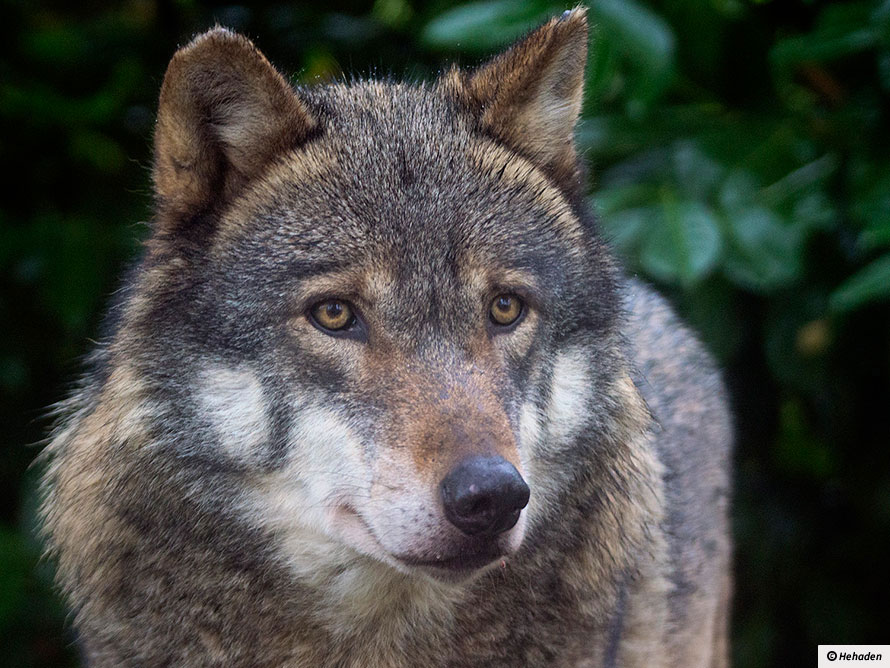Should we welcome them? Some claim that reintroducing wolves would revive the countryside. But others believe that the risk is too great.
'Wild, subhuman, evil'. Wolves are back!
Should we welcome them? Some claim that reintroducing wolves would revive the countryside. But others believe that the risk is too great.
Pack attack?
Carlo steps outside his hut in the AppeninesA mountain range in Italy.. Snow gleams on the mountains. Suddenly he notices a dark shape among the trees. A wolf! It stops for a moment; then an unearthly sound fills the landscape: "Owww! Owww!" The howling freezes Carlo's blood.
If Derek Gow has his way, this scene could be re-enacted in Britain before long. Gow is a champion of rewildingReturning developed or farmed land to its natural state by reintroducing species that once lived there. , and he wants to reintroduce wolves. But sheep farmers worry about the danger to their flocks.
Gow argues1 that wolves are more important than sheep: "Landscapes with high densities of sheep have many fewer insects; there is erosionThe breaking down or wearing away of land - e.g. soil and stone. , vegetation loss, flooding and pollution."
Wolves could also play an important part in controlling the deer population, which does great damage to trees. At present it stands at two million.2
Wolves have long caught the imagination of storytellers. They have inspired tales such as Little Red Riding Hood and the legend of Romulus and RemusIn Roman mythology, twin brothers who founded the city of Rome. .
In Rudyard Kipling's The Jungle Book, Mowgli is adopted by wolves. In Joan Aiken's The Wolves of Willoughby Chase, Bonnie and Sylvia flee from them.
Several European countries already have wolf packs. There are an estimated 3,000 wolves in Spain and Portugal.3
The animals are protected by EUEuropean Union. An economic and political union of 27 countries. law. But France, Finland and Norway have carried out culls to control their numbers. In France around 15,000 farm animals a year are killed by wolves.4
Writing in Country Life, John Lewis-Stempel sides with the farmers. He says they have improved the landscape without damaging biodiversityBiodiversity is all the different kinds of life you'll find in one area - the variety of animals, plants, fungi, and even microorganisms like bacteria that make up our natural world. Each of these species and organisms work together in ecosystems, like an intricate web, to maintain balance and support life. : "Allow the meadow to revert to wolfy wildwood: you deprive the skylark of a home."
In Germany, the authorities have tried to strike a balance. "Wolf commissioners" work with farmers to protect their animals. There is also generous compensation for livestock killed by wolves.
Should we welcome them?
Yes: When it comes to caring for the environment, nature knows best. We should restore the landscape to how it was before humans introduced agriculture and let wild animals roam free.
No: Wolves do not have a scary reputation for nothing. They are a real threat to humans as well as other animals. Farmers have a hard enough time making a living without worrying about fierce predators.
Or... Wolves are fine as long as they have enough space. The answer is to keep them in protected areas such as national parks where they can hunt freely and do not feel the need to trespassTo enter someone's land without permission. on farmland.
Keywords
Appenines - A mountain range in Italy.
Rewilding - Returning developed or farmed land to its natural state by reintroducing species that once lived there.
Erosion - The breaking down or wearing away of land - e.g. soil and stone.
Romulus and Remus - In Roman mythology, twin brothers who founded the city of Rome.
EU - European Union. An economic and political union of 27 countries.
Biodiversity - Biodiversity is all the different kinds of life you'll find in one area - the variety of animals, plants, fungi, and even microorganisms like bacteria that make up our natural world. Each of these species and organisms work together in ecosystems, like an intricate web, to maintain balance and support life.
Trespass - To enter someone's land without permission.
‘Wild, subhuman, evil’. Wolves are back!
 Fearsome: The European grey wolf is thriving in the Netherlands, Belgium and Germany.
Fearsome: The European grey wolf is thriving in the Netherlands, Belgium and Germany. Glossary
Appenines - A mountain range in Italy.
Rewilding - Returning developed or farmed land to its natural state by reintroducing species that once lived there.
Erosion - The breaking down or wearing away of land - e.g. soil and stone.
Romulus and Remus - In Roman mythology, twin brothers who founded the city of Rome.
EU - European Union. An economic and political union of 27 countries.
Biodiversity - Biodiversity is all the different kinds of life you'll find in one area — the variety of animals, plants, fungi, and even microorganisms like bacteria that make up our natural world. Each of these species and organisms work together in ecosystems, like an intricate web, to maintain balance and support life.
Trespass - To enter someone's land without permission.
